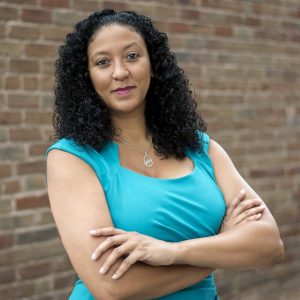South Carolinian to lead Gullah Geechee commission
Victoria Smalls named ED of multi-state heritage group
The Gullah Geechee Cultural Heritage Corridor Commission announced recently that Victoria Smalls of St. Helena Island will be its next executive director.
 Smalls (right) is a National Park Ranger with the Reconstruction Era National Historical Park in Beaufort, a public historian, educator, arts advocate, and cultural preservationist. She also serves as a maven for the S.C. Arts Commission program “The Art of Community: Rural SC,” helping her community reimagine itself through an arts lens.
Smalls (right) is a National Park Ranger with the Reconstruction Era National Historical Park in Beaufort, a public historian, educator, arts advocate, and cultural preservationist. She also serves as a maven for the S.C. Arts Commission program “The Art of Community: Rural SC,” helping her community reimagine itself through an arts lens.
Beginning July 26, she will lead the four-state National Heritage Area under the National Park Service that extends from North Carolina to Florida. A “rigorous national search process” was used to identify its new leadership.
“I am profoundly grateful for the opportunity to advance the great work of the commission, where I can serve the corridor in a focused capacity—as an advocate and connector—promoting the magnificent richness of the culture, sharing the beauty of the people, and helping to support and uplift our communities,” Smalls said.
Smalls served on the 13-member federal commission as a South Carolina commissioner from 2016-2020. She will return to lead the corridor with her extensive knowledge as a primary resource in the Gullah Geechee community, working in cultural education and development, across the corridor and internationally. The corridor’s mission is to create and build strategic alliances to strengthen the preservation and stimulation of Gullah Geechee people and communities within the global corridor.
The Gullah Geechee Cultural Heritage Corridor was established in 2006 by Congress to recognize and preserve the cultural treasures of Gullah Geechee people. Gullah Geechee people are direct descendants of enslaved people brought from primarily Africa’s rice-producing regions who were forced to work for almost two centuries on coastal plantations in North Carolina, South Carolina, Georgia and northern Florida. In 2013, the Secretary of the Interior and the National Park Service approved the Gullah Geechee Cultural Heritage Corridor Management Plan in an effort to support the recognition of important contributions made by Gullah Geechee people, their history, traditions and origins. Guiding the Corridor through its reauthorization process this year is an important first responsibility for the new executive director.
Dr. Dionne Hoskins-Brown of Savannah chairs the Commission and leaves the role of acting director as Smalls assumes leadership.
“I am absolutely ecstatic that we are able to place someone as capable as Ms. Smalls at the helm of our organization. She is eminently qualified, uniquely prepared, and profoundly representative of the community,” Hoskins-Brown said.
A lifelong member and descendent of the Gullah Geechee community, Smalls has emerged as one of the thriving voices in cultural preservation education.
Her professional work in Beaufort County in 2012 at the Historic Penn Center on St. Helena Island, one of the country’s first schools for formerly enslaved people. She then served for five years as the director of history, art, and culture and director of the York W. Bailey Museum. In 2019, Smalls returned to Penn Center to serve in various roles, including as a cultural, historical, and creative diplomat and providing leadership and strategic direction while articulating positive impacts of the Penn Center’s 159-year history to the public. She is as a commissioner with the South Carolina African American Heritage Commission, through which she assisted in identifying and promoting the preservation of historic sites, structures, buildings, and culture of the African American experience.
Smalls is also a Riley Fellow with Furman University’s Riley Institute’s Diversity Leaders Initiative, which helps leverage diversity to improve organizational outcomes and drive social and economic progress in South Carolina.
Smalls has additional experience serving with partnering organizations and commissioned boards that align with the mission of the commission, including:
- the International African American Museum (IAAM) as program manager,
- as a cultural consultant for the Joyner Institute for Gullah and African Diaspora Studies at Coastal Carolina University,
- and most recently with the National Park Service (NPS) as a park ranger at the Reconstruction Era National Historical Park in Beaufort that educates the public on the Reconstruction Era (1861-1900), the historic period in which the U.S. grappled with how to integrate millions of newly freed African Americans into social, political, economic, and labor systems.
In the latter role, she provided education and interpretation at historic sites to diverse visitors, conducted presentations for secondary and higher education audiences, conducted relevant research, and served as the liaison between affiliated networks.

